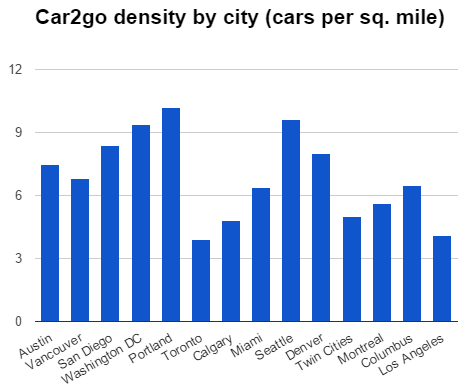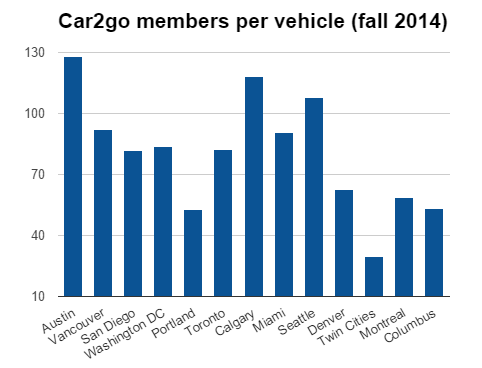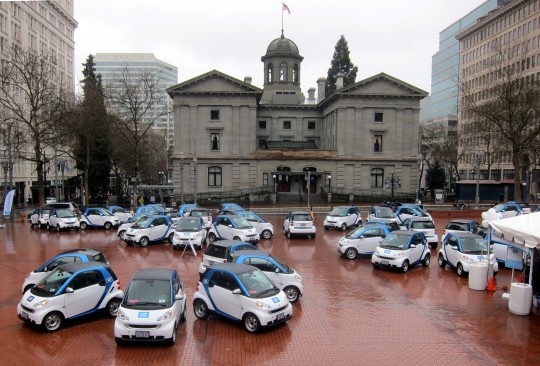Fifteen years after Portland introduced commercial carsharing to North America, Portlanders are continuing to show how businesses that enable occasional car use can fit into a modern multimodal city.
Since car2go launched in Portland in 2012, it’s steadily grown its local fleet from 250 to 530 cars, the largest in the country for any single city and the largest in North America in cars per square mile of home area — 10.2.

(Data source: car2go)
That’s according to data shared by car2go Tuesday in response to a BikePortland request. It’s current as of October 2014.
Following Portland in cars2go per square mile are Seattle (9.6 cars per square mile) and Washington DC (9.4). The continent’s lowest ratio is 5 cars per square mile in the Twin Cities, but that may be related to the company’s July 2014 expansion into St. Paul.
Car2go’s history in Portland
Portland was the fifth North American city to get car2go, following Austin, Vancouver, San Diego and Washington DC. Car2go remains the largest “floating-fleet” operator in the country, meaning that its two-seater vehicles can be picked up or dropped off anywhere within a designated home area. Parking, gas and insurance are included in the price of rental, which is currently 41 cents per minute up to $14.99 per hour.
Advertisement
Last month, the company chose Portland as the test city for its new bike racks, an experiment that we reported is being rigorously tested by local bicycle experts:
But in all seriousness, why has car2go chosen to offer so many cars in Portland? This is especially unusual considering that after almost three years of gathering members, Portland has the second-smallest car2go member base per car on the continent:

Two theories for car2go’s local success
The density of cars2go in Portland, despite the small member base, suggests that the service has a particularly dedicated base of users here. Here are a couple possible reasons:
Portland lacks Uber or Lyft service. As we’ve reported, ridesharing companies Uber and Lyft have decided not to start operating in Portland because of its unusually strict penalty — jail time — for operating an unlicensed taxi. Portland is one of only a handful of major cities where neither service is available. With these fairly similar services growing rapidly in other cities, car2go might be focusing its resources in Portland in order to capture market share while it can.
The best bike cities are also the best car2go cities. Portland and DC are the No. 1 and No. 2 large U.S. cities for bike commuting; Seattle is No. 6.
“A rising tide of car-lite residents lifts all alternative modes,” wrote Steve Gutmann, a local entrepreneur who’s worked for Carshare Portland, Flexcar and Getaround, in an email Tuesday. “I think it has everything to do with having lots of options that facilitate car-free and car-lite lifestyles. I think that Uber would further accelerate the trend.”
Though there are lots of factors involved here — and the low car2go density in the bike-friendly Twin Cities is a point against this theory — here’s an interesting chart shared this summer on the website of Dave Brook, the local entrepreneur who helped get the carsharing business rolling when he founded Carshare Portland in 1998. It’s a map of the roles different modes play in a city’s transportation network:

The image suggests that one-way carsharing like car2go works well in the same urban context as biking and walking (for trips of similar distance, that is) without competing much with them (because it’s more “flexible”). I’m not sure this captures my own experience, but it’s an interesting way to think about low-car life — and a plausible explanation for why Portland is leading the continent in one-way carsharing as well as biking.
Update 11:15 am: Brook writes to add another theory: Portland might have an unusual number of small car-free households with some disposable income living in the central city. “Probably a high concentration of the right demographic users within the Home area,” he writes. “It seems likely they would be the right demographic for bikesharing, as well.”
Also, reader Ryan H. shares the news that Seattle caps its car2go fleet at the current 500, but that it’s discussing raising that limit to 750 if companies agree to serve outlying areas as well. BMW and Zipcar are also looking to enter the Seattle market with car2go-like services.
Correction 11:40 pm: An earlier version of this post misstated the order of cities in which car2go launched.



